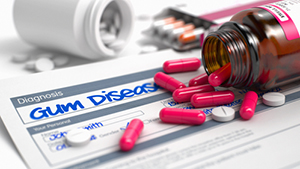 In November 2016, the International Journal of Impotence Research published a scientific literature review by Chinese researchers on the relationship between a specific mouth issue and ED.
In November 2016, the International Journal of Impotence Research published a scientific literature review by Chinese researchers on the relationship between a specific mouth issue and ED.
The scariest part is that you probably have no idea you’re experiencing this issue till you visit your dentist.
But tackling it, will improve your overall health and especially ED.
The researchers analyzed data from five earlier studies conducted between 2009 and 2014. Altogether, these studies had 213,000 male subjects between ages 20 and 80.
All five studies had remarkably similar results: erectile dysfunction was 2.28 times more common among men with gum disease than in men without it.
So what exactly is gum disease?
It occurs when bacteria grow on your teeth, causing inflammation in your gums. It can result in the progressive loss of the bone around your teeth, and if left untreated, your teeth will fall out.
If your gums are somewhat red or swollen, or bleed when you floss or brush, you probably have early signs of gum disease.
But how are these two seemingly unrelated issues (ED and gum disease) connected?
Short answer: Inflammation
Inflammation is your immune system’s reaction to bacteria or other potentially harmful microorganisms.
When your immune system is involved in a full out war against these microorganisms (like in your gums), it can spread to the walls of your blood vessels.
Inflammation damages the endothelial cells that line your blood vessel walls and thereby alters their structure. By so doing, it can cause high blood pressure and the development of cholesterol plaques.
Your penis also has blood vessels and endothelial cells that line their walls. These are the vessels that must relax to allow blood to flow into your penis to make an erection possible.
If these vessels cannot relax properly and allow enough blood through, you will not be able to have an adequate erection.
Therefore, it is important to clean your teeth at least twice a day and floss. Furthermore, visit your dentist twice a year for deep cleaning (especially if you already have some form of gum disease).
In addition, eat as many foods as possible with anti-inflammatory effects, like fruits and vegetables that contain vitamins A and C, tomato, watermelon, and guava for lycopene, shellfish and poultry for selenium, olive oil for monounsaturated fat, fish and flaxseed oil for omega-3, and so forth.

 Overcoming IBD
Overcoming IBD Multiple Sclerosis
Multiple Sclerosis Banishing Bronchitis
Banishing Bronchitis Gum Disease Gone
Gum Disease Gone Overcoming Onychomycosis
Overcoming Onychomycosis Neuropathy No More
Neuropathy No More The Prostate Protocol
The Prostate Protocol Brain Booster
Brain Booster
 Ironbound
Ironbound
 Solution for Shingles
Solution for Shingles
 The Bone Density Solution
The Bone Density Solution
 The Ultimate Healing Protocol
The Ultimate Healing Protocol
 The Parkinson's Protocol
The Parkinson's Protocol
 The Chronic Kidney Disease Solution
The Chronic Kidney Disease Solution
 Overthrowing Anxiety
Overthrowing Anxiety The Fatty Liver Solution
The Fatty Liver Solution The Hypothyroidism Solution
The Hypothyroidism Solution
 The End of Gout
The End of Gout The Blood Pressure Program
The Blood Pressure Program
 The Oxigized Cholesterol Strategy
The Oxigized Cholesterol Strategy
 Stop Snoring And Sleep Apnea Program
Stop Snoring And Sleep Apnea Program
 The Arthritis Strategy
The Arthritis Strategy The Vertigo & Dizziness Program
The Vertigo & Dizziness Program The 3-Step Diabetes Strategy
The 3-Step Diabetes Strategy Hemorrhoids Healing Protocol
Hemorrhoids Healing Protocol The Erectile Dysfunction Master
The Erectile Dysfunction Master Weight Loss Breeze
Weight Loss Breeze The IBS Program
The IBS Program The Insomnia Program
The Insomnia Program The Migraine and Headache Program
The Migraine and Headache Program The Neck Pain Solution
The Neck Pain Solution The Menopause Solution
The Menopause Solution The Ejaculation Master
The Ejaculation Master The TMJ Solution
The TMJ Solution The Acid Reflux Solution
The Acid Reflux Solution The Fibromyalgia Solution
The Fibromyalgia Solution The Psoriasis Strategy
The Psoriasis Strategy